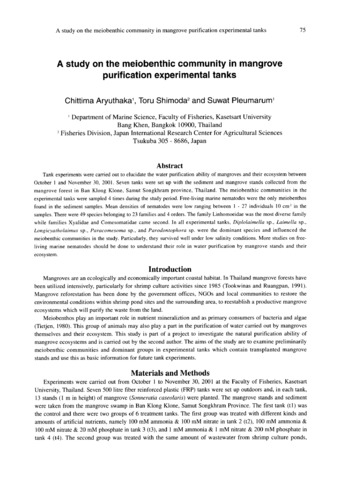A study on the meiobenthic community in mangrove purification experimental tanks
- Global styles
- MLA
- Vancouver
- Elsevier - Harvard
- APA
- Help
Share
Abstract
Tank experiments were carried out to elucidate the water purification ability of mangroves and their ecosystem between October 1 and November 30, 2001. Seven tanks were set up with the sediment and mangrove stands collected from the mangrove forest in Ban Klong Klone, Samut Songkhram province, Thailand. The meiobenthic communities in the experimental tanks were sampled 4 times during the study period. Free-living marine nematodes were the only meiobenthos found in the sediment samples. Mean densities of nematodes were low ranging between 1 - 27 individuals 10 cm-2 in the samples. There were 49 species belonging to 23 families and 4 orders. The family Linhomoeidae was the most diverse family while families Xyalidae and Comesomatidae came second. In all experimental tanks, Diplolaimella sp., Laimella sp., Longicyatholaimus sp., Paracomesoma sp., and Parodontophora sp. were the dominant species and influenced the meiobenthic communities in the study. Particularly, they survived well under low salinity conditions. More studies on free-living marine nematodes should be done to understand their role in water purification by mangrove stands and their ecosystem.
Suggested Citation
Aryuthaka, C., Shimoda, T., & Pleumarum, S. (2003). A study on the meiobenthic community in mangrove purification experimental tanks. In Y. Ogawa, H. Y. Ogata, Y. Maeno, T. Shimoda, Y. Fujioka, & Y. Fukuda (Eds.), Proceedings of the 2nd Workshop of the JIRCAS International Collaborative Research: Studies on Sustainable Production Systems of Aquatic Animals in Brackish Mangrove Areas , December 2-3, 2002, Penang, Malaysia (pp. 75-79). Japan International Research Center for Agricultural Sciences.
Type
Conference paperISSN
1341-710XSeries
JIRCAS Working Report;No. 35



